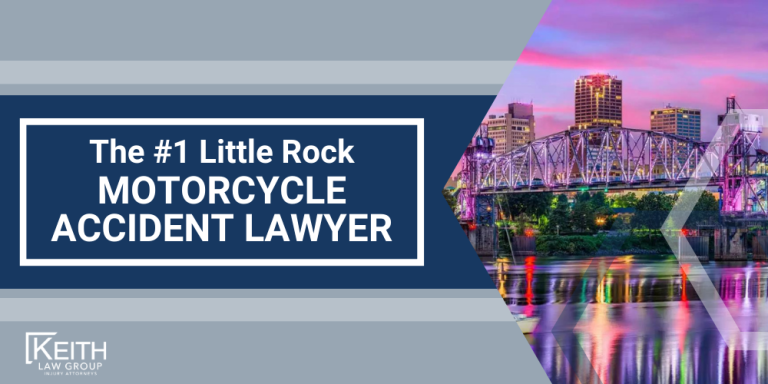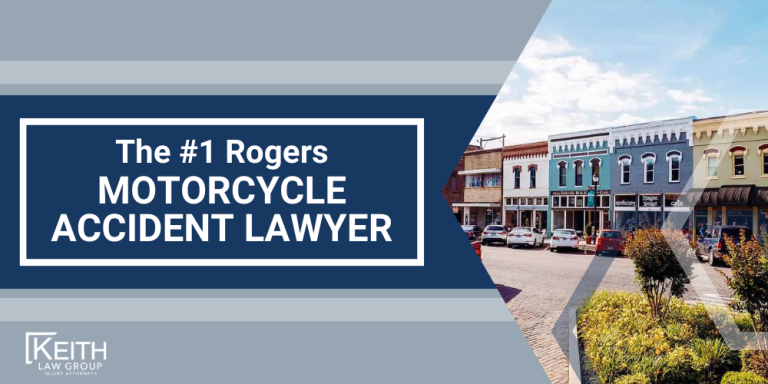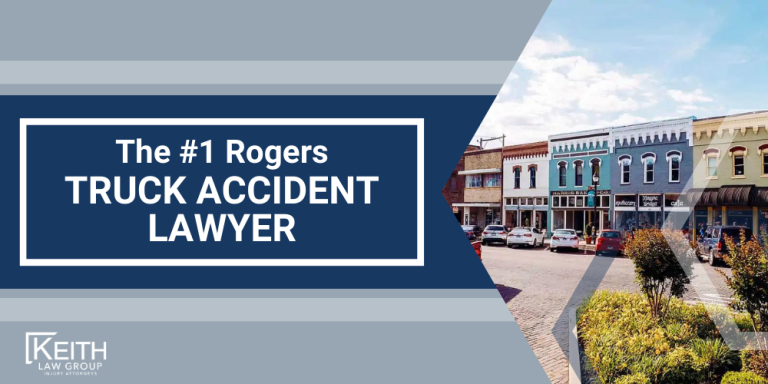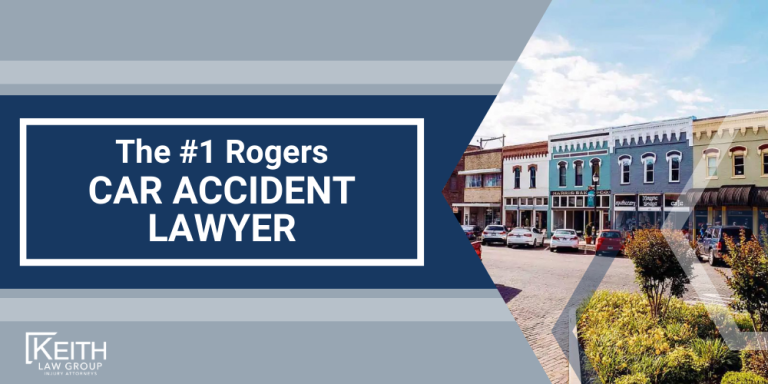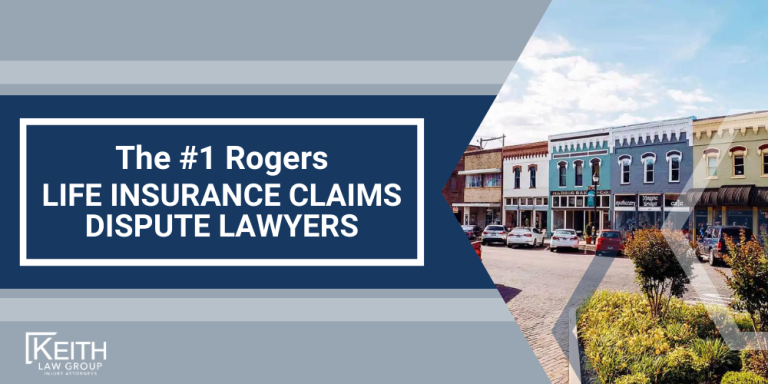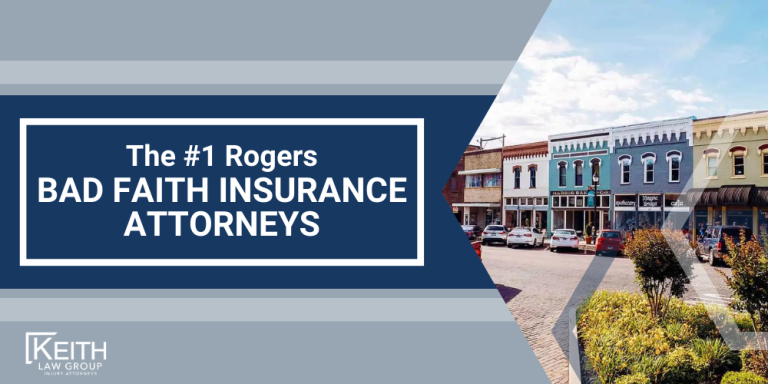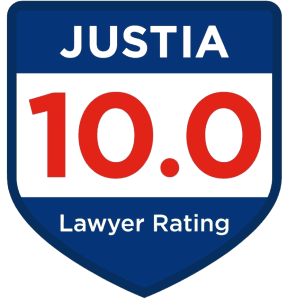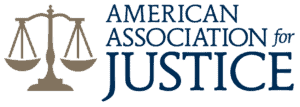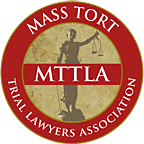- Last Updated: November 11th, 2025

Attorney Sean T. Keith has been a personal injury lawyer for 30+ years, a nationally recognized Top 100 Trial Lawyer, and top car accident lawyer & motor vehicle accident lawyer in Arkansas.
Legally Reviewed
This article has been written and reviewed for legal accuracy and clarity by the team of writers and attorneys at Keith Law Group and is as accurate as possible. This content should not be taken as legal advice from an attorney. If you would like to learn more about our owner and experienced injury lawyer, Sean T. Keith, you can do so here.
Fact-Checked
Keith Law Group does everything possible to make sure the information in this article is up to date and accurate. If you need specific legal advice about your case, contact us. This article should not be taken as advice from an attorney.
Sean Keith's Accollades & Practice Areas He Specializes In
- Over $20 Million recovered in Medical Device Injury Lawsuits.
- Over $13 Million recovered in Car Accident Lawsuits and other Motor Vehicle Accident Lawsuits.
- Over $100 Million recovered in total on behalf of clients.
- Sean represents clients in cases involving personal injuries, car accidents, motorcycle accidents, truck accidents, wrongful death, slip and falls, nursing home abuse cases, nursing home elopement cases, and more.
Do You Need Help From an Experienced Motorcycle Accident Attorney in Rogers, Arkansas (AR)? Contact Keith Law Group Today
Were you injured in a motorcycle accident in Rogers, Arkansas?
Contact an experienced Rogers motorcycle accident lawyer from Keith Law Group at (479) 326-7734 if you have been injured in a motorcycle accident in Rogers, Arkansas (AR) at no fault of your own.
You can also use our website chat for a free instant case evaluation.
A motorcycle accident can dramatically disrupt your life, leaving you with serious physical injuries, emotional trauma, and overwhelming financial challenges.
Our dedicated team of Rogers motorcycle accident lawyers at Keith Law Group are committed to guiding you through the personal injury lawsuit process to help you recover the full compensation you deserve.
When you hire an experienced motorcycle accident lawyer from Keith Law Group, you gain a trusted advocate committed to providing top-tier legal services and representation that addresses the unique aspects of your situation.
On this page, we’ll discuss how a Rogers motorcycle accident lawyer can help you secure maximum compensation in your motorcycle accident claim, the process for filing a motorcycle accident case in Arkansas, and much more.
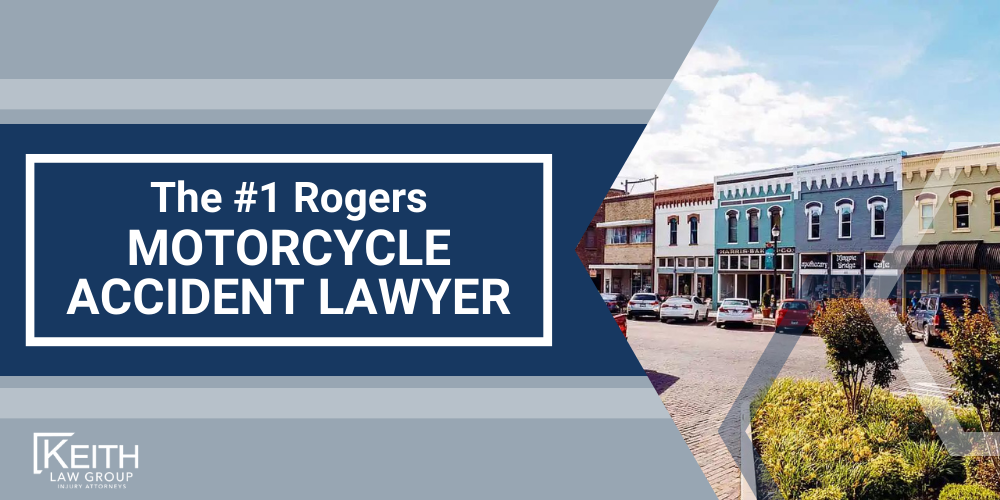
Our Experienced Rogers Motorcycle Accident Lawyers are Prepared to Help You
Motorcycle accidents are often devastating, leaving riders with serious injuries and significant financial burdens.
Unlike drivers of passenger vehicles, motorcyclists have little protection in a collision, making them more vulnerable to severe harm.
Motorcycle accident victims frequently face challenges in obtaining fair compensation, as insurers may unfairly stereotype riders or downplay the severity of their injuries.
At Keith Law Group, we understand the unique risks motorcyclists face and are dedicated to standing up for their rights.
Our experienced law firm helps victims recover compensation for medical expenses, lost wages, pain and suffering, and more.
Whether your accident was caused by a negligent driver, hazardous road conditions, or a defective motorcycle part, we will thoroughly investigate your case and pursue the justice you deserve.

If you’ve been injured in a motorcycle accident, Keith Law Group is here to help you take the first step toward recovery.
Contact us for a free consultation to find out if you qualify for a personal injury claim.
Use the chat feature on this page for an instant case evaluation and to get in touch with an experienced personal injury attorney today.
Motorcycle accidents can deeply affect victims and their families, resulting in life-altering injuries, emotional distress, and overwhelming financial strain.
The sudden loss of mobility or independence, combined with the stress of mounting medical bills and lost income, often leaves families feeling uncertain about the future.
A compassionate and experienced motorcycle accident lawyer can provide the guidance and support needed to secure fair compensation.
Reach out to us today. We’re here to help you.
Table of Contents

Meet the Rogers Motorcycle Accident Lawyers at Keith Law Group

Keith Law Group is operated by a dedicated team with decades of experience.
Leading our firm is our founder, Sean Keith, a nationally recognized trial attorney and lifelong Arkansas resident with over 30 years of experience.
Sean has represented clients in a wide range of personal injury cases, including car accidents, truck crashes, and product liability lawsuits.
His leadership and extensive trial experience have earned him numerous accolades, including being named a Top 100 Trial Lawyer and securing multimillion-dollar verdicts in high-profile cases.
Sean currently serves as a member of the Arkansas Supreme Court Model Civil Jury Instructions Committee and was appointed in 2015 by Governor Asa Hutchinson to sit as a Special Justice on the Arkansas Supreme Court.
Brynna Barnica is a highly experienced attorney at Keith Law Group, bringing over 17 years of legal practice to the firm.
After being admitted to the bar in 2006, Brynna began her career in criminal defense and later served as a Deputy Prosecuting Attorney for Benton County, where she handled a wide range of criminal cases, including jury trials for serious offenses such as homicide.
At Keith Law Group, Brynna continues to advocate passionately for those in need of justice, focusing on personal injury cases and helping injured clients secure the compensation they deserve.
Both of our attorneys at Keith Law Group are graduates of the University of Arkansas School of Law and have extensive experience working within the legal system of Northwest Arkansas.
Their deep knowledge of the local courts and legal processes allows them to effectively represent clients in a wide range of personal injury cases.
How Much Does it Cost to Hire a Motorcycle Accident Lawyer from Keith Law Group?
Hiring a motorcycle accident lawyer from Keith Law Group comes at no upfront cost because we work on a contingency fee basis.
This means you only pay if we successfully recover compensation for you, whether through a settlement or trial verdict.
A contingency fee arrangement ensures that financial barriers do not prevent you from accessing high-quality legal representation.
We take on the financial risks of your case so you can focus on your recovery without worrying about legal expenses.
At Keith Law Group, we are dedicated to providing fair and accessible legal services to injury victims in Rogers and across Arkansas.
If you were injured in an accident in Rogers that did not involve a motorcycle, you can likely find the attorney you need on any of the following pages:
What To Do After a Motorcycle Crash in Rogers, Arkansas
A motorcycle crash can leave victims shaken, injured, and unsure of what to do next.
Taking the right steps after an accident is crucial to protect your health, preserve evidence, and secure your legal rights.
While prioritizing your safety and medical care, it’s also important to gather as much information as possible to support a future claim.
These actions can help lay the foundation for holding the responsible party accountable and obtaining fair compensation.
We understand that a severely injured motorcyclist may not be able to complete these steps after a crash, and that’s where our legal team can step in to help.
At Keith Law Group, we take on the responsibility of gathering evidence, handling insurance communications, and managing the legal process, so you don’t have to.
This allows injured victims and their families to focus on what matters most—healing and rebuilding their lives.

Steps to take after a motorcycle accident include:
- Seek Immediate Medical Attention – Prioritize your health and have injuries evaluated, even if they seem minor.
- Call Law Enforcement – Report the accident to the police and ensure an official report is filed.
- Document the Scene – Take photos of the accident, vehicle damage, road conditions, and any visible injuries.
- Exchange Information – Collect contact and insurance details from the other driver(s) involved.
- Gather Witness Information – Obtain names and contact details from anyone who saw the accident.
- Avoid Discussing Fault – Refrain from admitting fault or making statements about liability at the scene.
- Contact a Motorcycle Accident Lawyer – Speak with an experienced attorney to protect your rights and explore your legal options.
- Preserve Evidence – Keep records of medical bills, repair estimates, and any correspondence with insurers.
- Follow Medical Advice – Adhere to your doctor’s treatment plan to aid recovery and strengthen your claim.
Common Evidence in Motorcycle Accident Cases
Evidence is essential in motorcycle accident cases to establish liability, prove the severity of injuries, and support claims for compensation.
Properly collected and preserved evidence strengthens your case and ensures no crucial detail is overlooked.
From accident scene documentation to expert reports, presenting clear and compelling evidence can make a significant difference in achieving a fair outcome.

Types of evidence in a motorcycle accident claim may include:
- Police Reports – Official documentation of the accident, including fault determinations and citations issued.
- Photographs and Videos – Visual evidence of the crash scene, vehicle damage, road conditions, and injuries.
- Medical Records – Proof of injuries sustained and the medical treatment required.
- Witness Statements – Testimonies from individuals who saw the accident occur.
- Helmet and Gear Damage – Evidence of the force of the impact and severity of the crash.
- Surveillance or Dashcam Footage – Recordings that capture the accident or events leading up to it.
- Accident Reconstruction Reports – Expert analysis of how the crash occurred and who may be at fault.
- Insurance Correspondence – Records of communications with insurers regarding claims or settlements.
- Employment Records – Documentation of lost wages or diminished earning capacity due to the accident.
- Motorcycle Maintenance Records – Proof of regular maintenance, countering claims of mechanical issues.
Common Damages in a Motorcycle Accident Case
Damages in a motorcycle accident case refer to the financial compensation awarded to a victim to address the losses caused by the crash.
These damages are designed to cover both tangible expenses, such as medical bills and lost wages, and intangible losses, like pain and suffering.
Motorcycle accident cases often involve severe injuries, making it crucial to account for the full scope of the victim’s losses to ensure fair compensation.
An experienced motorcycle accident lawyer can help calculate both economic and non-economic damages following a motorcycle crash.

Common types of damages include:
- Medical Expenses – Medical costs for emergency care, surgeries, hospital stays, medications, physical therapy, and future medical needs.
- Lost Wages – Compensation for income lost during recovery or due to long-term disability.
- Pain and Suffering – Non-economic damages for physical pain and emotional distress caused by the accident.
- Property Damage – Costs to repair or replace the motorcycle and any other damaged personal property.
- Loss of Enjoyment of Life – Compensation for the inability to engage in hobbies, activities, or everyday pleasures.
- Disfigurement and Scarring – Damages for permanent scars or injuries that alter appearance.
- Loss of Consortium – Compensation for the impact the injuries have on relationships with loved ones.
- Out-of-Pocket Expenses – Reimbursement for transportation, home modifications, or other accident-related costs.
- Punitive Damages – Awarded in cases involving egregious negligence or willful misconduct by the at-fault party.
The Legal Process for Motorcycle Accident Claims in Arkansas
Arkansas law requires motorcycle accident victims to prove that another party’s negligence directly caused their injuries to pursue compensation.
The state follows a modified comparative fault rule, meaning a victim can recover damages as long as they are less than 50% at fault for the accident.
Arkansas imposes a three-year statute of limitations on personal injury claims, making it critical to act promptly to protect your legal rights.
Evidence such as police reports, medical records, and witness statements are essential for building a strong claim.
Understanding the legal process can help victims navigate their case more effectively and maximize their compensation.

Steps in the legal process for motorcycle accident claims include:
- Seek Immediate Medical Attention – Obtain treatment for your injuries and ensure proper documentation of all medical care.
- Consult an Experienced Attorney – Discuss your case with a lawyer who understands Arkansas motorcycle accident laws and can guide you through the process.
- Investigation and Evidence Collection – Gather key evidence, including accident reports, photographs, and witness statements, to establish liability.
- Filing an Insurance Claim – Submit a claim to the at-fault party’s insurance company, supported by the evidence collected.
- Negotiation of a Settlement – Work with your attorney to negotiate a fair settlement that reflects the full extent of your damages.
- Filing a Lawsuit (if necessary) – If a settlement cannot be reached, file a formal legal complaint within Arkansas’s three-year statute of limitations.
- Discovery Process – Exchange evidence and information with the opposing party to strengthen your case.
- Trial or Settlement – Present your case in court or finalize a settlement agreement to resolve the claim.
Each step in this process is designed to protect your rights and help you secure the compensation you deserve.
An experienced motorcycle accident attorney can handle these steps on your behalf.
Common Types of Motorcycle Accidents and Motorcycle Injuries
Motorcycle accidents often involve severe injuries due to the lack of protection for riders, making collisions with passenger vehicles or commercial trucks especially devastating.
Determining liability can be complicated, as these accidents frequently involve negligent drivers, hazardous road conditions, or even mechanical defects.
Each accident is unique, with causes ranging from distracted or impaired driving to failure to yield or unsafe roadways.
The resulting injuries and damages, from traumatic brain injuries to extensive medical bills and lost income, require a thorough investigation to ensure victims receive the compensation they deserve.
Types and Causes of Motorcycle Accidents
Motorcycle accidents can occur in many ways, often due to the negligence of other drivers or hazardous road conditions.
Understanding the common types of accidents and their causes is crucial for identifying liability and pursuing a claim.

Types and causes of motorcycle accidents include:
- Head-On Collisions – Often caused by distracted or impaired drivers crossing into oncoming traffic.
- Left-Turn Accidents – Occur when a vehicle turns left in front of an oncoming motorcycle.
- Lane-Splitting Accidents – Result from tight spacing and drivers failing to notice motorcyclists.
- Rear-End Collisions – Frequently caused by tailgating or failure to stop in time.
- Sideswipe Accidents – Happen when a vehicle changes lanes without checking blind spots.
- Single-Vehicle Accidents – Result from poor road conditions, debris, or mechanical failure.
- Distracted Driving – Drivers using phones or other devices while behind the wheel.
- Speeding – Reduces reaction times and increases the severity of collisions.
- Failure to Yield – Drivers not giving motorcycles the right of way at intersections.
- Driving Under the Influence – Impaired drivers unable to react appropriately to motorcycles.
- Hazardous Road Conditions – Potholes, loose gravel, and wet roads increasing the risk of loss of control.
Motorcycle Accident Injuries
Motorcycle accidents often result in severe injuries due to the lack of protection for riders compared to occupants of other motor vehicles.
These injuries can range from minor to life-altering and may require extensive medical care and long-term recovery.

Common motorcycle accident injuries include:
- Traumatic Brain Injuries (TBIs) – Often caused by impacts to the head, even when wearing a helmet.
- Spinal Cord Injuries – Resulting in paralysis or reduced mobility, often requiring lifelong care.
- Broken Bones – Common in the arms, legs, and ribs due to the force of impact or being thrown from the motorcycle.
- Road Rash – Severe skin abrasions that can lead to infection or permanent scarring.
- Internal Injuries – Damage to organs caused by blunt force trauma during the crash.
- Amputations – Loss of limbs due to crushing injuries or medical necessity following the accident.
- Lacerations and Bruising – Cuts and deep bruises from debris or contact with the ground.
- Psychological Trauma – Anxiety, PTSD, and emotional distress caused by the accident and its aftermath.
Keith Law Group: Your Rogers Motorcycle Accident Attorneys
The right motorcycle accident lawyer can make a massive difference in the pursuit of financial compensation after you’ve suffered severe injuries.
When you hire an experienced Rogers motorcycle accident lawyer from Keith Law Group, you can rest assured knowing that your case is in experienced hands, and we will fight to secure the compensation you deserve while you focus on your recovery.
Our team understands the unique challenges motorcyclists face and is dedicated to providing personalized, compassionate legal support every step of the way.
We have a proven track record of holding negligent parties accountable and achieving meaningful results for our clients.
Whether your case involves significant medical expenses, lost wages, or long-term impacts on your quality of life, we are here to help you rebuild and move forward.

Contact Keith Law Group today for a free consultation and take the first step toward justice.
Call us or use our online chatbot to get started.
Frequently Asked Questions
-
Hiring a motorcycle accident lawyer from Keith Law Group comes at no upfront cost because we work on a contingency fee basis.
This means you only pay if we successfully recover compensation for you, whether through a settlement or trial verdict.
A contingency fee arrangement ensures that financial barriers do not prevent you from accessing high-quality legal representation.
We take on the financial risks of your case so you can focus on your recovery without worrying about legal expenses.
At Keith Law Group, we are dedicated to providing fair and accessible legal services to injury victims in Rogers and across Arkansas.
-
In Arkansas, you have three years from the date of the motorcycle accident to file a personal injury claim, as set by the state’s statute of limitations.
Failing to file within this timeframe may result in losing your right to pursue compensation for your injuries and damages.
Acting promptly ensures that evidence is preserved, witnesses remain available, and your claim is as strong as possible.
-
If you receive a low settlement offer for your motorcycle accident claim, it’s important not to accept it without consulting an attorney.
Insurance adjusters often try to minimize payouts, and an experienced lawyer can evaluate the offer to determine if it reflects the true value of your damages.
Your attorney can negotiate on your behalf, presenting evidence of your medical expenses, lost wages, and other losses to push for a fair settlement of a monetary value that reflects what you’ve expereinced.
If negotiations fail, your lawyer may recommend filing a lawsuit to ensure your rights are fully protected and you receive the compensation you deserve.
-
Victims of motorcycle accidents may be entitled to compensation for both economic and non-economic damages, depending on the severity of their injuries and losses.
This includes covering immediate costs, long-term impacts, and the emotional toll of the accident.
Types of compensation may include:
- Medical Expenses – Costs for current and future treatments, surgeries, and medications.
- Lost Wages – Compensation for missed work and reduced earning capacity.
- Pain and Suffering – Damages for physical pain and emotional distress.
- Property Damage – Repair or replacement costs for your motorcycle and other personal property.
- Loss of Enjoyment of Life – Damages for reduced ability to participate in hobbies or daily activities.
- Punitive Damages – Awarded in cases involving extreme negligence or intentional harm.
-
When a motorcycle accident involves multiple parties, determining liability can become more complex.
Responsibility may be shared among drivers, commercial vehicle operators, or even entities like a municipality responsible for road maintenance.
In Arkansas, the state’s modified comparative fault rule allows each party to be held accountable for their percentage of fault, which affects the compensation you can recover.
An experienced Rogers motorcycle accident lawyer will thoroughly investigate the case, gather evidence, and identify all liable parties to maximize your compensation.
By holding each responsible party accountable, your attorney ensures you are fairly compensated for your injuries and damages.
-
Our Arkansas Personal Injury Law Firm has extensive experience handling various auto accident and injury cases throughout the state of Arkansas.
While each case is unique, we are confident that we’ve successfully represented clients in situations similar to yours.
While our expertise extends to Rogers and other areas across Arkansas, the pages below focus on Rogers — they are strictly intended to give you an idea of the wide range of injury and accident cases a lawyer from our team can help you with:
- Personal Injury Lawyer Rogers, Arkansas (AR)
- Rogers Car Accident Lawyer
- Rogers Truck Accident Lawyer
- Rogers Motorcycle Accident Lawyer
- Rogers Insurance Claims Lawyer
- Rogers Premises Liability Lawyer
- Rogers Slip and Fall Lawyer
- Rogers Pedestrian Accident Lawyer
- Rogers Nursing Home Abuse Lawyer
- Rogers Boat Accident Lawyer
- Rogers Bicycle Accident Lawyer
- Rogers Wrongful Death Lawyer
- Rogers Traumatic Brain Injury Lawyer
Other Rogers Practice Areas
You pay
nothing
unless we win
Do You Have A Case?
Other Rogers Personal Injury Cases We Handle
Related Articles

Choose Us For Your Personal Injury Case
- Available 24/7
- No Upfront Fees
- Free Case Evaluation
- No Fees Unless We Win!
